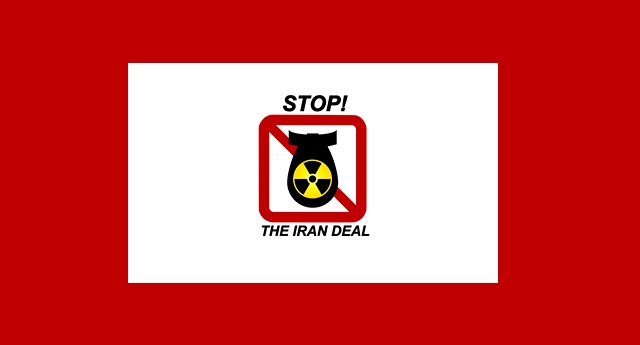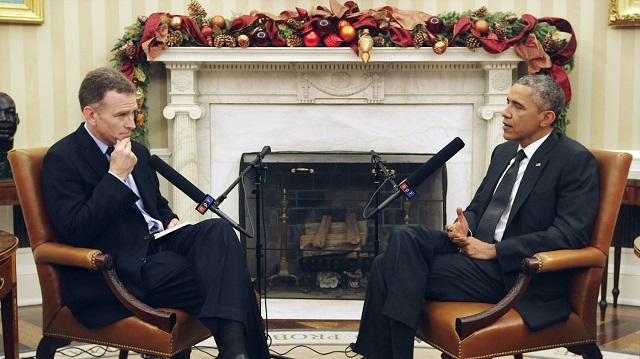Time for a March in Washington, D.C. to Stop the Iran Nuke Deal
President Obama may be on a vacation with the family, however his West Wing political operatives are busily trying to line up Democrat votes in both the Senate and House enabling him to veto anticipated Republican majority resolutions.
While New York Democrat Senator Charles Schumer has come out against the pact, he demurred from active advocacy of his position. The Hill noted in its Whip List count that Rep. Pete Roskam (R-IL) has signed up 218 of 243 Republican colleagues for a resolution opposing the Iran nuclear pact. The Hill Whip List vote tally, as of August 14, 2015, on the Democrat side of aisle shows Democrats divided with 48 “Yes”, 16 leaning in that direction, 11 “No,” 2 leaning towards “No” and 58 “undecideds.” The resolutions are likely to be voted on by both Chambers before September 17th following Congress reconvening just after Labor Day.
The ultimate choice of which way the undecideds will go will depend on what they learn from Town Hall meetings and constituent calls, tweets and emails. If respected polls are any indication, millions of Americans have voiced concerns that Iran’s track record as a cheater on nuclear weapons developments and state support for terrorism preclude trusting it. The JCPOA will immediately release tens of billions for Iran to expand hegemony in the Middle East. In 10 years it will add over 1 trillion dollars in additional sanctions relief to Iran and the Mullahs that run it.
Already the international sanctions regime has been shredded by Iranian Quds Force commander Soleimani’s violation of travel bans and purchases of Russian advanced air defense systems and Chinese stealth fighter jets. Italian, French and other Foreign Ministers have led trade delegations to Tehran to ink billions in pre-approval deals. Just this week, the Swiss lifted some of their financial sanctions, doubtless both the Russians and Chinese will follow suit, as their sequestered funds comprise the majority of off shore resources . Moreover, Iranian Foreign Minister Zarif is endeavoring to broker the Syrian Crisis. With the nuclear deal, the Islamic regime is gaining traction in the Middle East courtesy of Obama’s outreach and the pending nuclear pact.
While many Congressional Democrats and liberal media pundits contend that the nuclear pact is not perfect, they suggest it is better than the alternative. Orde Kittrie, Senior Fellow and leading expert on non proliferation law and policy at the Washington, DC Foundation for Defense of Democracies in a Wall Street Journal opinion piece, yesterday contends that the unsigned political agreement can be and should be amended by Congress. He cites as evidence the 200 plus incidents, include ing nuclear test ban and arms control agreements with Russia during the Cold War era. There is also the recent 2009 nuclear cooperation agreement with the United Arab Emirates, where Congress demanded changes and material improvement to international agreements before granting consent.
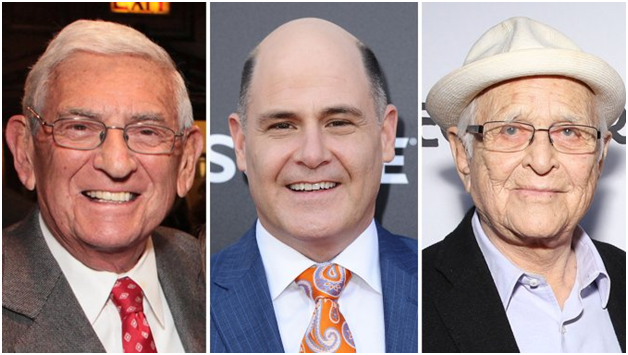
Eli Broad, Matthew Weiner and Norman Lear Hollywood Jewish Backers of Iran Nuclear Pact Source: Hollywood Reporter.
Testimonials from Prominent Hollywood Jewish Backers of Iran Nuclear Deal
The White House has been bombarding media with ‘testimonials’ in favor of the Iran nuclear deal. There was one from three dozen retired generals and admirals, another from 29 of the nation’s leading scientists, and still yet another from 100 former ambassadors. The argument from the former senior officers in the military was the agreement is “the most effective means currently available to prevent Iran from obtaining nuclear weapons.” The scientists called the Iran deal “technically sound, stringent and innovative”.
The other voice heard from was the liberal Jewish Hollywood mogul crowd and J Street rabbis’ who bought an ad in the L.A Jewish Journal, and other newspapers of record. Israel National News (INN) noted among them were leading campaign financial bundlers for Obama’s Presidential elections:
Among the seven lead signatories are billionaire philanthropist Eli Broad; Walt Disney Concert Hall architect Frank Gehry; and legendary TV writer-producer Norman Lear.
[…]
“I just felt that some of the mainstream Jewish organizations weren’t speaking on behalf of a large segment of the community that has a different point of view,” Matthew Velkes told The Hollywood Reporter, adding that LA’s Jewish population is “as diverse a community as one might imagine.”
INN drew attention to the letter signed by these Hollywood Jewish supporters of Obama published in the Hollywood Reporter:
We appreciate that many have reasonable concerns about the risks of a complex nuclear weapons development agreement with an untrustworthy adversary like Iran. We too hold these concerns, but the deal that was reached is not founded on trust; it is grounded in rigorous inspections and monitoring.
They view killing the deal as a “tragic mistake.”
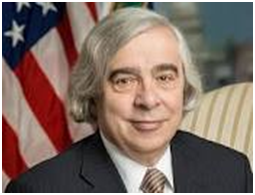
U.S. Energy Secretary Earnest Moniz
Secretary of Energy Moniz discusses the Iran deal on a National Jewish Federation Webcast
I watched a National Jewish Federation live interview with Secretary of Energy, Dr. Earnest Moniz, extolling the virtues of the Iran nuclear deal from technical aspects. Retired MIT physics professor Moniz knows the subject well. He was an official in the Clinton Administration during the failed attempt to reign in North Korea from achieving nuclear breakout. The on-line audience was a third of the 10,000 viewers when Israeli Prime Minister Netanyahu expounded his thesis about why the nuclear pact was a bad deal given existential threats to both the US and Israel.
The Hill cited Moniz saying on the webcast that the Iran nuclear deal “would aid in fighting terrorism.” The Administration’s primary concern he said was to cut off all paths for Iran from achieving a bomb. A path, he acknowledged, currently would take less than two to three months to achieve with the 80 tons of fissile material on hand. However, he suggested that when the existing stock of fissile material was reduced by 98 percent under the current proposal it would set back by a decade industrializing nuclear development. He also told the on-line audience that there were no secret side deals. Rather he characterized them as confidential arrangements between the IAEA and Iran that would allow for close monitoring of Iran nuclear developments. He suggested, when asked by viewer, not to worry about the Parchin military test site, as the Energy Department’s labs have developed the technical means of identifying even trace amounts of nuclear residue. The Problem is the Ayatollah has barred the IAEA and any US inspectors from visiting Parchin and ‘known’ military development sites. Further, Moniz suggested the US was supplying the 24/7 monitoring technology to the IAEA covering the entire Iranian nuclear production pathway from mine through enrichment.
Watch Secretary Moniz’s Jewish National Federation Vimeo video presentation:
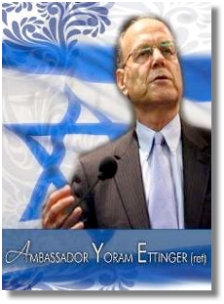 What the polls of Americans show.
What the polls of Americans show.
Yoram Ettinger, former Israeli Congressional liaison with the rank of Ambassador, in an Israel Hayom column highlighted the findings of several polls. They reflected Americans’ deep concern about the nuclear deal with Iran. Here are the highlights of what Ettinger addressed in his Israel Hayom column:
According to RealClearPolitics’ most recent polls, a major wedge has evolved between the US constituents, on the one hand, and US policy-makers, on the other hand, when it comes to foreign policy and national security: a mere 38.5% approval rating of President Obama’s foreign policy. For instance, a CNN poll documented a majority disapproval of Obama’s handling of Islamic terrorism, and a majority backing the use of military force against ISIS.
The voters’ deep distrust of the Ayatollahs is documented by the annual Gallup poll of Country Rating. … Iran is rated as the second least favored country by Americans with 11% favorability, ahead of North Korea – 9% and behind Afghanistan (14%), Syria (14%) and the Palestinian Authority (17%), compared with Israel’s 70%.
In addition, Gallup shows that 77% and 84% of US constituents regard nuclearized Ayatollahs and international terrorism, respectively, as “critical threats.” Gallup indicates that “Americans’ views on [the Ayatollahs] have remained unchanged for 26 years.”
According to the August 3, 2015 poll, conducted by Quinnipiac University Polling Institute, “American voters oppose the nuclear pact negotiated with Iran 57 to 28 percent, with only lukewarm support from Democrats and overwhelming opposition for Republicans and independent voters.”
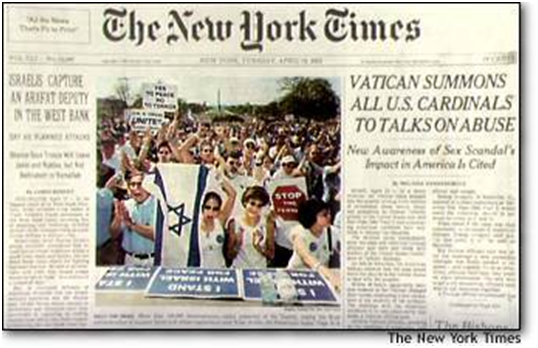
New York Times Front Page April 16, 2002.
The 2002 Washington Rally to Stand with Israel.
I recently exchanged thoughts with the AIPAC Florida regional director about a possible march in Washington, just after Labor Day when Congress reconvenes to address the looming vote on the Iran deal. I recalled vividly my personal impressions of being in the multitude estimated at over 100,000 at the Stand with Israel Rally on April 15, 2002 gathered to hear speakers on the back lawn of the US Capitol. The rally was the genius of current executive vice chairman of the Conference of President of Major American Jewish Organizations, Malcolm Hoenlein, that despite daunting logistics and busing arrangements organized the event in less than five days.
That rally occurred in the wake of the Second Intifada that witnessed the horrific suicide bombing on March 27, 2002, the Passover Massacre at the Park Hotel in Netanya, Israel. 30 elderly holocaust survivors were killed and over 140 injured and maimed. The Washington Rally in 2002 was directed at Palestinian terrorism occurring less than a year after 9/11 in lower Manhattan. Clearly, there was solidarity among Christians and Jews gathered in support of Israel who listened to former Mayor Rudy Giuliani, former House Minority Leader Richard Gephardt (D-MO) and Sen. Harry Reid (D-NV), now departing Senate Minority leader. The small contingent of pro-Palestinian advocates were swamped, but not abused by the attentive crowd. Pictures and reports of the rally were front page items the following day in newspapers of record like the Los Angeles Times, Washington Post and the New York Times. In the wake of the 2002 Washington Rally Christians United for Israel was formed. I suggested to the Florida AIPAC regional director, we needed to do that again, now.
The March to Save America in Washington, September 9, 2015
Serendipitously, Tom Harb, an Orlando businessman and leader in the Lebanese diaspora, sent me an email introducing the group currently organizing a March to Save America for which it has been given a permit in Washington, scheduled for Wednesday, September 9th. That led to a discussion with a Los Angeles-based spokesperson for the March. She indicated that starting this weekend and early next week, the March organizers will issue press releases and break news of the March on a major cable news network. She referred me to their website at: www.marchtosaveamerica.org with a statement from founding Committee Chairman, Barry Nussbaum. Here are some key excerpts:
Congress is about to vote on a deal with Iran that essentially consents to their belligerent military goals, with some delays specified. …. There is no historical precedent for Iran’s compliance. Nor, does the deal require “anytime, anywhere” inspection. Rigorous verification of Iran’s adherence to the deal is virtually impossible.
[…]
The deal does not require Iran to materially dismantle its nuclear infrastructure while it includes, practically speaking, the irreversible dismantling of the sanctions that brought Iran to the negotiating table in the first place. Easy circumvention of the deal’s restrictions can only lead to the war that Iran has promised. A majority of Americans (2/3 as of August 2015) have learned enough details to oppose it.
[…]
The only way to stop the deal, at this stage, is to put major pressure on Congress to reject it. While many organizations are working tirelessly through lobbying individual Members of Congress to stop the deal, we feel that the strongest statement America can make is to unite through a march on Washington: The March To Save America, September 9, 2015.
Stay tuned for developments! Watch this brief YouTube video on The March to Save America:
EDITORS NOTE: This column originally appeared in the New English Review.

